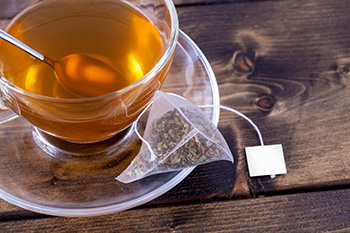More Health and Nutrition Bites
Related
Good News for Those Who Love Chocolate, Wine or Tea
I've talked before about the positive effects of polyphenols, which are found in fruits like grapes and in tea, red wine, cocoa and coffee. The largest subtype of polyphenols are called flavonoids. There's been some really interesting research linking the intake of flavonoids and a reduced risk of Alzheimer's Disease and dementia in general.
Have a cup of (green) tea
The polyphenols (antioxidants) in green tea have been shown in animal and in vitro studies to have protective benefits against cardiovascular disease and cancer. Human studies, however, have been small and their results varied. Drs. Kuriyama and Shimazu and their colleagues in Japan made use of data from a large, long-term prospective study to analyze the relationship between green tea consumption and the mortality rates due to cardiovascular disease, cancer, and all other reasons for death.
Drinking black tea may reduce your risk of ovarian cancer
Judging from the women in my practice, ovarian cancer may well be the most-feared diagnosis, even more than breast cancer. Why? Because the vast majority of ovarian cancers are not detected until they are quite advanced: only 15% of all ovarian cancer patients are diagnosed at an early stage of the disease (ovariancancer.org).
Health & Nutrition Bites
Get the latest health and diet news - along with what you can do about it - sent to your Inbox once a week. Get Dr. Gourmet's Health and Nutrition Bites sent to you via email. Sign up now!
Drink your tea

If I've said it once, I've said it a thousand times: "Instead of soda, drink water, coffee, or tea."
A recent study suggests that if you are female and the carrier of a certain gene, you might decide that tea is a better choice.
Researchers in Singapore invited residents at least 55 years old or over from a particular region of Singapore to participate in a study called The Singapore Longitudinal Aging Study (J Nutr Health Aging 2016;20(10):1002-1009). As part of the study, the participants responded to a variety of health and dietary questionnaires and provided blood for additional testing. One of the questionnaires was a test we doctors know as the MMSE - the Mini-Mental State Examination.
The Mini-Mental State Examination is a series of questions designed to test different cognitive functions, from orientation (knowing where and when you are), to immediate memory and short-term memory, and language functioning. It's a quick, cheap, and easy way to test for the presence of cognitive impairment - but it is not a diagnostice tool, meaning that it shows that a problem exists, but not why that problem exists.
Of the 957 participants who received scores of 26 or above on the MMSE (no cognitive impairment), about 30% did not drink tea at the start of the study. The 70% who did were divided into two groups: those who drank only black tea and those who drank both green tea and black tea. (Only one person drank green tea exclusively.) The tea drinkers were also broken out into groups according to how much tea they customarily drank, Low (less than 1 cup per day but more than 1 cup per week), Medium (1-2 cups per day), and High (3 or more cups per day).
As with the article a couple of weeks ago on Eggs and Alzheimer's, the researchers tested the participants to see if they were carriers of the gene apolipoprotein E4 (Apo-E4), which indicates a greater risk of developing dementia.
Between 3 and 5 years after the start of the study, the authors returned to visit the participants and again administered the MMSE along with their dietary and health questionnaires. Those participants whose scores fell into the realm of cognitive impairment were compared with those whose scores did not.
Even after taking into account other health and risk factors, those who drank the most tea and maintained that consumption from the start to the end of the study were 47% less likely to experience neurocognitive decline than those who did not drink tea at all. After separating the participants by gender and whether they carried the Apo-E4 gene, however, they discovered that the vast majority of those who benefitted from drinking tea were women: men who drank tea reduced their risk of neurocognitive decline by less than 10%, while women who drank tea reduced their risk of almost 70%. Those men and women who carried the Apo-E4 gene benefitted the most by far: carriers who drank tea reduced their risk by almost 85% compared to 44% for non-carriers.
What this means for you
The drawbacks of this study include the short duration of the study (ten years or less) and the relatively small number of people who experienced cognitive decline during that period. That said, along with its many other benefits, it does appear that drinking black tea regularly may help you avoid cognitive problems later in life. Note that those who benefitted the most in this study were those who drank tea at the start and the end of the study, which may indicate a much longer-term habit. Choose water, tea, or coffee instead of sodas. Caffeinated, or decaf? The authors of this study didn't seem to have asked, so I would recommend to my patients that they follow their preference.
First posted: March 15, 2017
